
George R. Smith College was a historically Black college located in Sedalia, Missouri, [1] it was attended by ragtime composer Scott Joplin, who was famous for the piano music piece "Maple Leaf Rag."

George R. Smith College was a historically Black college located in Sedalia, Missouri, [1] it was attended by ragtime composer Scott Joplin, who was famous for the piano music piece "Maple Leaf Rag."
The institution was associated with the Freedmen's Aid and Southern Education Society of the Methodist Church and played an important role in the lives of young people for several decades.
According to the Encyclopedia of the History of Missouri [2] edited by Howard L. Conard, the building was completed in 1882. The college operated from 1894 [3] until it burned down in April 26, 1925, after which its assets were merged with the Philander Smith College in 1933. [4] A photograph of George R. Smith College, with students, can be found among at the State Historical Society of Missouri. [5]
Throughout the history of the college, various men and women's sports teams were fielded. Athletic teams from George R. Smith were known as the Deweys. Their colors were purple and white. Men had the opportunity to play football, baseball, basketball and tennis, while women could participate in sports such as basketball, tennis, croquet, and swings. [10]
The 1903 George R. Smith Deweys football team won the HBCU football championship of Missouri. [11] In the championship-deciding game, the Deweys defeated the Lincoln Blue Tigers of Jefferson city by a score of 17-0, although the game was reportedly brutal and controversial.

Ragtime, also spelled rag-time or rag time, is a musical style that had its peak from the 1890s to 1910s. Its cardinal trait is its syncopated or "ragged" rhythm. Ragtime was popularized during the early 20th century by composers such as Scott Joplin, James Scott and Joseph Lamb. Ragtime pieces are typically composed for and performed on piano, though the genre has been adapted for a variety of instruments and styles.

Scott Joplin was an American composer and pianist. Dubbed the "King of Ragtime", he composed more than 40 ragtime pieces, one ragtime ballet, and two operas. One of his first and most popular pieces, the "Maple Leaf Rag", became the genre's first and most influential hit, later being recognized as the quintessential rag. Joplin considered ragtime to be a form of classical music meant to be played in concert halls and largely disdained the performance of ragtime as honky tonk music most common in saloons.

Sedalia is a city located approximately 30 miles south of the Missouri River and, as the county seat of Pettis County, Missouri, United States, it is the principal city of the Sedalia Micropolitan Statistical Area. As of the 2020 census, the city had a total population of 21,725. Sedalia is also the location of the Missouri State Fair and the Scott Joplin International Ragtime Festival. U.S. Routes 50 and 65 intersect in the city.

The Missouri–Kansas–Texas Railroad was a Class I railroad company in the United States, with its last headquarters in Dallas, Texas. Established in 1865 under the name Union Pacific Railroad (UP), Southern Branch, it came to serve an extensive rail network in Texas, Oklahoma, Kansas, and Missouri. In 1988, it merged with the Missouri Pacific Railroad; today, it is part of UP.
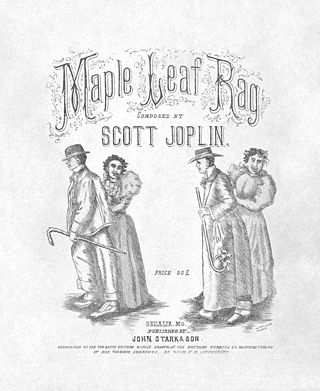
The "Maple Leaf Rag" is an early ragtime musical composition for piano composed by Scott Joplin. It was one of Joplin's early works, becoming the model for ragtime compositions by subsequent composers. It is one of the most famous of all ragtime pieces. Its success led to Joplin being dubbed the "King of Ragtime" by his contemporaries. The piece gave Joplin a steady if unspectacular income for the rest of his life.
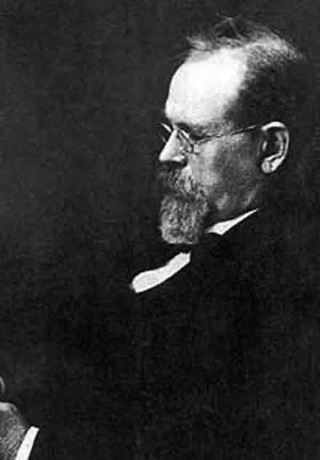
John Stillwell Stark was an American publisher of ragtime music, best known for publishing and promoting the music of Scott Joplin.
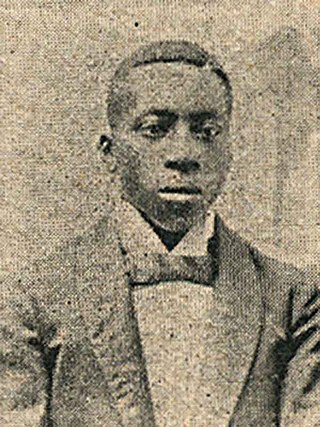
Arthur Owen Marshall was an American composer and performer of ragtime music from Missouri. He was a protege of famed ragtime composer Scott Joplin.

Scott Hayden was an American composer of ragtime music.
Etilmon Justus Stark was an American ragtime composer and arranger, the eldest son of ragtime publisher John Stark. His best-known works include the pieces "Trombone Johnsen" (1902), "Billiken Rag" (1913), and "Gum Shoe" (1917), and the arrangements for the collection "Fifteen Standard High Class Rags" (1912), popularly known as "The Red Back Book".
Richard “Dick” Zimmerman is a ragtime performer, historian, author and producer. He is regarded as being one of the key figures responsible for the worldwide revival of ragtime. Zimmerman is the first pianist to have recorded the complete works of Scott Joplin and in 1987 was awarded the first place prize “Champion Ragtime Performer of the World”. Zimmerman was technical advisor for the film Scott Joplin. He is a founder of the "Maple Leaf Club", and is the editor of its publication, "The Rag Times". Zimmerman is also a professional magician. He has contributed many signature illusions to the field of magic and has acted as consultant for such magicians as David Copperfield.

A Guest of Honor is the first opera created by celebrated ragtime composer Scott Joplin. The opera had two acts, followed the model of grand opera, and followed the events surrounding the 1901 White House dinner hosted by President Theodore Roosevelt for the civil rights leader and educator Booker T. Washington.

The Scott Joplin House State Historic Site is located at 2658 Delmar Boulevard in St. Louis, Missouri. It preserves the Scott Joplin Residence, the home of composer Scott Joplin from 1901 to 1903. The house and its surroundings are maintained by the Missouri Department of Natural Resources as a state historic site. The house was added to the National Register of Historic Places and designated a U.S. National Historic Landmark in 1976.
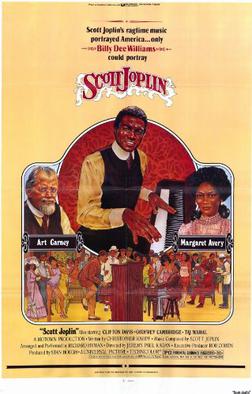
Scott Joplin is a 1977 biographical film directed by Jeremy Kagan and based on the life of African-American composer and pianist Scott Joplin. It stars Billy Dee Williams and Clifton Davis. Its script won an award from the Writers Guild of America in 1979. Eubie Blake makes an appearance in the movie.
The New England Ragtime Ensemble was a Boston chamber orchestra dedicated to the music of Scott Joplin and other ragtime composers.
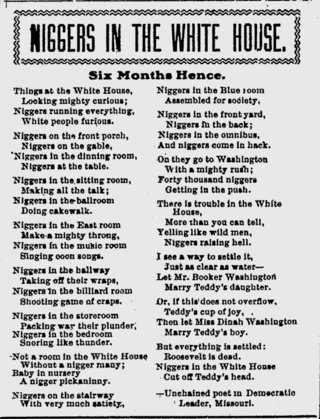
"Niggers in the White House" is a poem that was published in newspapers around the United States between 1901 and 1903. The poem was written in reaction to an October 1901 White House dinner hosted by Republican President Theodore Roosevelt, who had invited Booker T. Washington—an African-American presidential adviser—as a guest. The poem reappeared in 1929 after First Lady Lou Hoover, wife of President Herbert Hoover, invited Jessie De Priest, the wife of African-American congressman Oscar De Priest, to a tea for wives of congressmen at the White House. The identity of the author—who used the byline "unchained poet"—remains unknown.

On October 16, 1901, shortly after moving into the White House, President Theodore Roosevelt invited his adviser, the African American spokesman Booker T. Washington, to dine with him and his family. The event provoked an outpouring of condemnation from white politicians and press in the American South. This reaction affected subsequent White House practice and no other African American was invited to dinner for almost thirty years.

Myrtle Craig Mowbray, formerly Myrtle Craig, was the first African-American woman to graduate from the Michigan Agricultural College in 1907. She was later a schoolteacher and a professor at two historically black colleges and universities in Kansas and Missouri. The Mowbray Scholars Program at the Michigan State University Honors College is named in her honor.